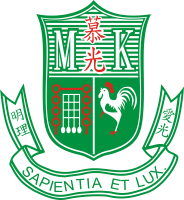| Language Policy |
Our school has adopted Chinese as the Medium of Instruction. This not only helps students to better understand and meet the demands of particular subjects, it also improves the learning outcomes for students. Concurrently, we utilize small-class teaching and ability grouping to provide students with the best possible opportunities and environment to enhance their English language proficiency. An English Immersion Class operates in Junior Forms. In this class, instruction in the majority of subjects is conducted in English, except Chinese and Chinese History. In senior forms, medium of instruction is based on subjects. |
| Learning and Teaching Strategies |
Ability grouping is widely used in selected subjects. This enables teachers to cater for the diversity of students. Besides curriculum planning, there are numerous schemes to enhance teaching and learning, e.g. English Enhancement Scheme, After School Support Scheme and Summer Tutorial Program.<br>The curriculum for junior forms necessarily focuses on training in basic skills, recognizing and supporting student potential and building a self-confident, independent and motivated learner. Integrated subjects in junior forms prepare students for the demands of the senior curriculum. To enhance life-wide learning, there are 3 outdoor learning activities per annum. All subjects cater for the diversity of students through the design of school based programs of work that are tailor-made for the specific needs and abilities of our students. |
| School-based curriculum |
1. Electives: 2X. Our school has set up 12 subjects, please refer to the school website for more details.<br> 2. Curriculum highlights: <br>(1) Chinese, English and Mathematics subjects, for example, design teaching and learning to meet the needs of the range of students by varying levels of difficulty and learning support for individual students. <br>(2) From 2021-2022, a third language (Japanese or Korean) will be introduced in junior form curriculum.<br>(3) The Integrated Science subject in Form Three consists of a combination of the disciplines; Physics, Chemistry and Biology. <br>(4) Our School has a special design curriculum, the free-of-charge Special Programme: Talent Development classes and Interest Learning classes, totally about 50 courses. |
| Approach to Catering for Learner Diversity |
The School takes a holistic approach supporting individual student development and accommodating student diversity:<br>Curriculum planning, ability grouping are widely used in major subjects to accommodate individual differences.<br>The School employs educational psychologists and speech therapists to support students with special needs.<br>Our school also offers after-school tutoring and provides a wide range of extra-curricular activities to support students’ needs and development. |
| Approach to Integrated Education |
Our school uses "a whole school approach" to promote an inclusive culture that accommodates a range of individual differences among students. Through various whole school and in class measures our school provides a wide range of practical and appropriate support to students who have differing learning needs. Including curriculum accommodation, differentiated teaching and performance assessment. In addition, the services of educational psychologists and speech therapists as well as various types of group training are arranged to meet the needs of individual students. |
| Education Support for Non-Chinese Speaking (NCS) Students |
|
| Home-School Co-operation |
Our school has established a Home-school Co-operation Committee aimed at developing mutually supportive relationships between teachers and parents, enhancing the connection with our community through the organization and participation in a variety of PTA activities. |
| School Ethos |
We are proactive in shaping students through discipline and the moral education of our students. All teachers and the school social workers actively work with students to develop self-discipline. In order to better care for our students, we assign two class teachers to each form class, while Junior Form students remain at school for lunch with their teachers.<br>Students' appropriate moral training occurs through assemblies, class teacher periods, and the Moral and Civic Service Reward Scheme. Students are encouraged and rewarded for their best academic performance and excellent behavior. |
| School Development Plan |
1. Broadening students' horizons and cultivating their multiple intelligence.<br>2. Catering for the diversity of our students and enhancing their reading habit.<br>3. Developing students' self-discipline with broad-mindedness. |
| Teacher Professional Training and Development |
Teacher professional training and development is supervised by a committee that monitors the current expertise of staff and proactively plans for the future professional needs of teachers and the school.<br>A survey of teacher expertise, interests, school needs and future systemic demands is analyzed to develop the 3 year overall plan for teacher professional training and development.<br>Combine collaborative lesson planning, peer lesson observation and specific teacher professional development sessions utilise teacher expertise, external experts and academia to provide an interesting and motivating professional development program that promotes teacher pedagogical development and the alignment of teaching, learning and assessing, thus strengthening staff expertise to improve student outcomes. |
| Life-wide Learning |
Students are encouraged to participate in group activities, in particular, community service activities; in addition, annual study tours or exchange programs are arranged for students to broaden their horizons and enhance their leadership skills.<br>Talent development program and Personal interest program are parts of the school-based curriculum that aim at developing students’ potentials. One mainly focuses on language learning, STEM education, and aspects in artistic ability. Students will have opportunities to participate in a wide range of activities and competitions organized by different sectors, and connect with the community. The other aims at developing students’ multiple intelligence and fostering students’ life-long interest through different learning experiences. |
